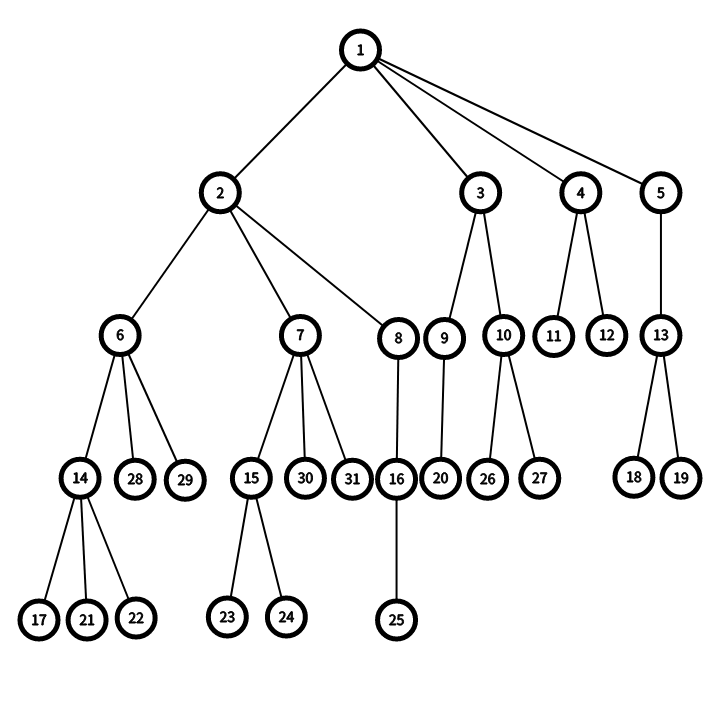7.【2024初三年前集训测试2】

\(\Huge打了一场模拟赛,又垫底了。qwq\)
2024初三年前集训测试2
\(T1\) 上海
\(0pts\)
死因
- \(__int128\) 不支持 \(pow\) (其实可以用 \(powl\) )。
- 事实上我打了一个快速幂
(在一千行代码里翻出来就行)。但是我打 \(qpow\) 时忘打 \(q\) 了,然后本地运行还没报错……就交上去了 - 之后结果就是,没过编。。。 \(\Huge🖤🖤🖤😤😤😤\)
- 改成
龙龙就对了。 \(\Huge😓\)
题解
- 还是比较好打的,给一个正整数 \(k(1\leq k\leq 10^{12})\) ,判断是否有一个正整数 \(n\) 使得 \(n^2\) 为 \(k\) 的倍数且 \(n\) 不是 \(k\) 的倍数。
- 想到对其进行分解质因数,一个数的平方质因子次数都是偶数,也就是说,假如 \(k\) 的质因子次数都为 \(1\) 那么就是无解的。
- 而有解情况就是 \(k\) 有次数大于 \(1\) 的质因子 (不是 \(square~free~number\) )。解就是 \(\LARGE\sum\limits_{i=1}^np_i^{\large\lceil\dfrac{c_i}{2}\rceil}\) 。
- 因此记录质因子以及次数,之后处理一下即可。
代码
说的再多也不如代码好使。 \(\Huge😋\)
#include<bits/stdc++.h>
#define int __int128//long long就够了
#define N (1000010)
#define sort stable_sort
using namespace std;
namespace IO
{
#define ll __int128
const int MAX=1<<24;
char buf[MAX],*p1=buf,*p2=buf;
char obuf[MAX],*o=obuf;
#define gc()(p1==p2&&(p2=(p1=buf)+fread(buf,1,1<<24,stdin),p1==p2)?EOF:*p1++)
//template<typename T>
//inline T read()
inline int read()
{
int x=0;bool f=1;
char c=gc();
for(;c<48||c>57;c=gc())if(c=='-')f=0;
for(;c>=48&&c<=57;c=gc())x=(x<<3)+(x<<1)+(c^48);
return f?x:~x+1;
}
void print(ll x){if(x>9)print(x/10);*o++=(x%10)+'0';}
void pit(ll x){if(x<0)*o++='-',x=~x+1;print(x);}
void write(ll x,char end){pit(x);*o++=end;}
void flush(){fwrite(obuf,o-obuf,1,stdout);}
#undef ll
}
using IO::read;using IO::write;using IO::flush;using std::complex;
inline int min(int x,int y){return y&((y-x)>>31)|x&(~(y-x)>>31);}
inline int max(int x,int y){return x&((y-x)>>31)|y&(~(y-x)>>31);}
inline void swap(int &x,int &y){int tmp=x;x=y;y=tmp;}
long long n,m;
int qpow(int x,int b)
{
int ans=1;
for(;b;b>>=1){if(b&1)ans=(ans*x);x=(x*x);}
return ans;
}
int pr[100],cnt[100],tot,ans=1;
signed main()
{
init_set();
n=read();
int len(sqrt(n)),nn(n);
for(int i(2);i<=len;++i)
{
if(!(nn%i))pr[++tot]=i,++cnt[tot],nn/=i;
for(;!(nn%i);nn/=i)++cnt[tot];
}
if(nn>1)pr[++tot]=nn,++cnt[tot];
for(int i(1);i<=tot;++i)
{
if(cnt[i]!=1)break;
if(i==tot)puts("-1"),exit(0);
}
for(int i(1);i<=tot;++i)
ans*=pow(pr[i],((cnt[i]+1)>>1));
write(ans,' ');
flush();
return 0;
}
\(T2\) 华二
\(0pts\)
话说为啥这次模拟赛题目名字这么瞩目。\(\Huge😝\)
题解
- 一个 \(1\leq a_i\leq 9\) 的数列,当 \(\gcd(a_i,a_{i+1})=1\) 时,就可以把它们的位置交换。
- 显然,对于( \(1\) , \(5\) , \(7\) )这三个法外狂徒来说,它们可以随意地变换位置。
- 对于 \((2,3)\) \((2,7)\) \((2,9)\) \((3,4)\) \((4,9)\) \((8,9)\) 六对数来说,也是可以交换的。
- 并且我们发现,可以将 \(6\) 单独分出来,因为它不能与其他数交换( \(1\) , \(5\) , \(7\) )除外,所以可以用 \(6\) 作为一个分隔符。而( \(2\) , \(4\) , \(8\) ),( \(3\) , \(9\) )不能与自己组内的数交换,所以基本框架就有了。
- 对于( \(1\) , \(5\) , \(7\) )可以在最后再处理,先去处理其他数。
- 将一样的数字看成一类,扫描数组,记录每个数字出现的次数,当我们在数组里扫到 \(6\) 或扫到最后一个数时,对每个组的数字出现的次数进行计算,之后将两个出现次数求一下组合数。 \(\large\dbinom{n}{m}=\dbinom{n}{n-m}\) 。然后乘起来就可以了。
- 之后将( \(1\) , \(5\) , \(7\) )进行处理,将它们插入到数组中,那就是 \(\dbinom{n}{x}\times\dbinom{n-x}{y}\times\dbinom{n-x-y}{z}\) ( \(x\) , \(y\) , \(z\) )是出现次数,\(n\) 是总数,接着乘起来就行了。
代码
#include<bits/stdc++.h>
#define int long long
#define N (1000010)
#define sort stable_sort
using namespace std;
namespace IO
{
#define ll long long
const int MAX=1<<24;
char buf[MAX],*p1=buf,*p2=buf;
char obuf[MAX],*o=obuf;
#define gc()(p1==p2&&(p2=(p1=buf)+fread(buf,1,1<<24,stdin),p1==p2)?EOF:*p1++)
//template<typename T>
//inline T read()
inline int read()
{
int x=0;bool f=1;
char c=gc();
for(;c<48||c>57;c=gc())if(c=='-')f=0;
for(;c>=48&&c<=57;c=gc())x=(x<<3)+(x<<1)+(c^48);
return f?x:~x+1;
}
void print(ll x){if(x>9)print(x/10);*o++=(x%10)+'0';}
void pit(ll x){if(x<0)*o++='-',x=~x+1;print(x);}
void write(ll x,char end){pit(x);*o++=end;}
void flush(){fwrite(obuf,o-obuf,1,stdout);}
#undef ll
}
using IO::read;using IO::write;using IO::flush;using std::complex;
inline int min(int x,int y){return y&((y-x)>>31)|x&(~(y-x)>>31);}
inline int max(int x,int y){return x&((y-x)>>31)|y&(~(y-x)>>31);}
inline void swap(int &x,int &y){int tmp=x;x=y;y=tmp;}
long long n,m;
void init_set()
{
#ifndef ONLINE_JUDGE
freopen("in.txt","r",stdin);
freopen("out.txt","w",stdout);
#endif
#ifdef ONLINE_JUDGE
freopen("b.in","r",stdin);
freopen("b.out","w",stdout);
#endif
ios::sync_with_stdio(0);
cin.tie(0),cout.tie(0);
}
int qpow(int x,int b)
{
int ans=1;
for(;b;b>>=1){if(b&1)ans=(ans*x);x=(x*x);}
return ans;
}
int x,y;
int P(998244353),a[100010],jc[100010],ans=1,tot;
int op[20];
int exgcd(int a,int b,int &x,int &y)
{
if(!b){x=1,y=0;return a;}
int d=exgcd(b,a%b,y,x);
y-=(a/b*x);
return d;
}
int gcd(int a,int b){return b?gcd(b,a%b):a;}
int inv_it(int a,int P=P){int d(exgcd(a,P,x,y));return(x%P+P)%P;}
int jc_C(int n,int m,int P=P){return((jc[n]*inv_it(jc[m]))%P*inv_it(jc[n-m]))%P;}
signed main()
{
init_set();
n=read();
jc[0]=jc[1]=1;
for(int i(1);i<=n+1;++i)jc[i]=(jc[i-1]*i)%P;
for(int i(1);i<=n;++i)a[i]=read();
int r(1),x(0),y(0);
for(;r<=n;++r)
{
++op[a[r]];
if(a[r]==6||r==n)
x=op[2]+op[4]+op[8],
y=op[3]+op[9],
ans=(ans*jc_C(x+y,x))%P,
op[2]=op[3]=op[4]=op[8]=op[9]=0;
}
x=n-op[5]-op[7];
ans=(ans*jc_C(x,op[1]))%P;
x+=op[5];
ans=(ans*jc_C(x,op[5]))%P;
x+=op[7];
ans=(ans*jc_C(x,op[7]))%P;
write(ans,' ');
flush();
return 0;
}
\(T3\) 高爸
\(40pts\) (唯一得上的分)\(\Huge🙃\)
(恼!)
- 场上打了个暴力,本来是枚举力量值,改成了三分,(其实是错的)。然后得了 \(40\) 。
- 之后下午开始改题,从 \(5\) 点左右开始改 \(T3\) 改到 \(9\) 点半发现三分写错了,没绷住。。。 \(\Huge😠😡\)
题解
- 柿子是(设当前要修改到 \(x\) ,有 \(n\) 条大力龙, \(m\) 条小力龙)
\[\large a(\sum\limits_{i=1}^{n+m}(x-a_i)[a_i<x])+b(\sum\limits_{i=1}^{n+m}(a_i-x)[a_i>x])
\]
这是最显然的柿子。由于有 \(n\) 个大龙, \(m\) 个小龙,所以也可以变成
\[\large a(m\times x-\sum\limits_{i=1}^{n+m}(a_i[a_i<x]))+b(\sum\limits_{i=1}^{n+m}(a_i[a_i>x])-n\times x)
\]
- 平衡树,线段树,树状数组应该都可以求解,这里选择又快码量又少的树状数组。
- 首先这个不是普通树状数组,而是权值树状数组。权值树状数组就是在树状数组下标为 \(i\) 的地方存储在 \(a_1\) 到 \(a_n\) 也就是原数组中有多少数大小为 \(i\) 。因此前缀和就存储了小于等于 \(i\) 的数的个数,这样就能二分查找第 \(k\) 大的值。需要进行排序,去重也就是离散化。
- 之后将值存入树状数组,我们要维护第 \(i\) 小的数的前缀和与个数。对每个值进行三分,由于树状数组 \(O(\log n)\) ,三分 \(O(\log_3(n))\) , \(n\) 次询问,所以最后是 \(O(n\log^2n)\) 。
- 对于三分,我们假设在一个不是龙力量值的地方取到了最优解,假如不在龙力量值的地方取到了最优解,那么修改到相邻的龙力量值也是最优解。假如只有这个地方是最优解,由于从相邻龙力量值修改到这个值导致更优,那么继续向另一个龙力量值靠拢也会导致更优,所以最优解一定是一个龙的力量值。
- 其中 \(num\) 存储了等于 \(i\) 的数的个数,而 \(sum\) 存储的就是从大小 \(1\) 到 \(i\) 的前缀和, \(hit\) 存储的是离散化后 \(a_i\) 的位置,这样就能够求出当修改到第 \(i\) 大的数需要有多少的修改。然后乘以对应的价值加起来即可。
代码
#include<bits/stdc++.h>
#define int long long
#define N (1000010)
#define sort stable_sort
using namespace std;
namespace IO
{
#define ll unsigned long long
const int MAX=1<<24;
char buf[MAX],*p1=buf,*p2=buf;
char obuf[MAX],*o=obuf;
#define gc()(p1==p2&&(p2=(p1=buf)+fread(buf,1,1<<24,stdin),p1==p2)?EOF:*p1++)
//template<typename T>
//inline T read()
inline int read()
{
int x=0;bool f=1;
char c=gc();
for(;c<48||c>57;c=gc())if(c=='-')f=0;
for(;c>=48&&c<=57;c=gc())x=(x<<3)+(x<<1)+(c^48);
return f?x:~x+1;
}
void print(ll x){if(x>9)print(x/10);*o++=(x%10)+'0';}
void pit(ll x){if(x<0)*o++='-',x=~x+1;print(x);}
void write(ll x,char end){pit(x);*o++=end;}
void flush(){fwrite(obuf,o-obuf,1,stdout);}
#undef ll
}
using IO::read;using IO::write;using IO::flush;using std::complex;
inline signed min(signed x,signed y){return y&((y-x)>>31)|x&(~(y-x)>>31);}
inline long long min(long long x,long long y){return y&((y-x)>>63)|x&(~(y-x)>>63);}
inline signed max(signed x,signed y){return x&((y-x)>>31)|y&(~(y-x)>>31);}
inline long long max(long long x,long long y){return x&((y-x)>>63)|y&(~(y-x)>>63);}
inline void swap(int &x,int &y){int tmp=x;x=y;y=tmp;}
long long n,m;
void init_set()
{
#ifndef ONLINE_JUDGE
freopen("in.txt","r",stdin);
freopen("out.txt","w",stdout);
#endif
#ifdef ONLINE_JUDGE
freopen("c.in","r",stdin);
freopen("c.out","w",stdout);
#endif
ios::sync_with_stdio(0);
cin.tie(0),cout.tie(0);
}
int a[100010],tot;
int cf[100010];
int hi,lo,op[100010],hit[100010];
struct aa{int num,sum;}c[100010];
inline signed lowbit(signed x){return x&(~x+1);}
void update(signed x)
{for(signed i(hit[x]);i<=tot;i+=lowbit(i))c[i].sum+=a[x],++c[i].num;}
inline pair<int,int>query(signed x)
{
int ans1(0),ans2(0);
for(;x;x-=lowbit(x))ans1+=c[x].num,ans2+=c[x].sum;
return make_pair(ans1,ans2);
}
signed main()
{
init_set();
n=read();hi=read(),lo=read();
for(signed i(1);i<=n;++i)a[i]=op[i]=read(),cf[i]=cf[i-1]+a[i];
sort(op+1,op+1+n);
tot=unique(op+1,op+1+n)-op-1;
for(signed i(1);i<=n;++i)
hit[i]=lower_bound(op+1,op+1+tot,a[i])-op;
write(0,'\n');update(1);
for(signed t(2);t<=n;++t)
{
update(t);
signed l(1),r(tot);
unsigned int ans(0);
for(;l<=r;)
{
signed len((r-l)/3),ml(l+len),mr(r-len);
pair<int,int>lres=(query(ml)),rres(query(mr));
unsigned int Orz((lres.first*op[ml]-lres.second)*hi+(cf[t]-lres.second-(t-lres.first)*op[ml])*lo);
unsigned int OTZ((rres.first*op[mr]-rres.second)*hi+(cf[t]-rres.second-(t-rres.first)*op[mr])*lo);
if(Orz<=OTZ)r=mr-1,ans=Orz;
else l=ml+1,ans=OTZ;
}
write(ans,'\n');
}
flush();
return 0;
}
\(T4\) 金牌
\(0pts\)
题解
- 本来想到用树剖,打了板子却发现不会打…… \(\Huge😢😢😢\)
- 虽然树剖需要严重卡常,但是赛后开了 \(1.5s\) 时限。
- 设 \(op_i\) 为以 \(i\) 为根的子树到 \(i\) 的贡献。
- 设 \(gen_i\) 为去掉以 \(i\) 为根的子树的贡献的贡献。
所以有这两个柿子:
\[\Large op_i=2\times op_{son_{i}}+2
\]
\[\Large gen_i=2\times gen_{fa_i}+2+2\times(op_{fa_i}-2\times op_i-2)
\]
- 有两种情况, \(x\) 是 \(y\) 的祖先,设 \(res\) 为 \(x\) 在 \(x\) 到 \(y\) 路径上的儿子(也是 \(y\) 的祖先)。所以可得
\[\Large 2^{dis{_y}{_,}{_{res}}}\times(op_y+1)\times gen_{res}
\]
\(dis\) 也就是距离了。
- 另一种就直接
\[\Large 2^{dis{_y}{_,}{_x}}(op_x+1)\times(op_y+1)
\]
- 由于树剖时间复杂度 \(O(n\log^2n)\) ,比不上 \(Tarjan\) 的 \(O(n+m)\) 。尽管确实是跑不满,但是该怎么卡常就怎么卡常…… \(\Huge😐😐😐\)
- 注:正解 \(Tarjan\) 。
(恼!!!) \(\Huge😡😡😡😭😭😭\)
- 因为取模问题又调了上午三个和下午一个小时。
代码
\(99pts\)
#include<bits/stdc++.h>
#define int long long
#define N (1000010)
#define sort stable_sort
using namespace std;
namespace IO
{
#define ll long long
const int MAX=1<<24;
char buf[MAX],*p1=buf,*p2=buf;
char obuf[MAX],*o=obuf;
#define gc()(p1==p2&&(p2=(p1=buf)+fread(buf,1,1<<24,stdin),p1==p2)?EOF:*p1++)
//template<typename T>
//inline T read()
inline int read()
{
int x=0;bool f=1;
char c=gc();
for(;c<48||c>57;c=gc())if(c=='-')f=0;
for(;c>=48&&c<=57;c=gc())x=(x<<3)+(x<<1)+(c^48);
return f?x:~x+1;
}
void print(ll x){if(x>9)print(x/10);*o++=(x%10)+'0';}
void pit(ll x){if(x<0)*o++='-',x=~x+1;print(x);}
void write(ll x,char end){pit(x);*o++=end;}
void flush(){fwrite(obuf,o-obuf,1,stdout);}
#undef ll
}
using IO::read;using IO::write;using IO::flush;using std::complex;
inline signed min(signed x,signed y){return y&((y-x)>>31)|x&(~(y-x)>>31);}
inline long long min(long long x,long long y){return y&((y-x)>>63)|x&(~(y-x)>>63);}
inline signed max(signed x,signed y){return x&((y-x)>>31)|y&(~(y-x)>>31);}
inline long long max(long long x,long long y){return x&((y-x)>>63)|y&(~(y-x)>>63);}
inline void swap(int &x,int &y){x^=y^=x^=y;}
long long n,m;
void init_set()
{
#ifndef ONLINE_JUDGE
freopen("in.txt","r",stdin);
freopen("out.txt","w",stdout);
#endif
#ifdef ONLINE_JUDGE
freopen("d.in","r",stdin);
freopen("d.out","w",stdout);
#endif
ios::sync_with_stdio(0);
cin.tie(0),cout.tie(0);
}
int x,y,P(998244353);
int dis[1000010],d[1000010];
int siz[1000010],f[1000010],son[1000010],op[1000010];
int rk[1000010],gen[1000010];
int top[1000010],dfn[1000010],cnt,lss;
vector<int>e[1000010];
void dfs1(int x,int fa)
{
d[x]=d[fa]+1;f[x]=fa;siz[x]=1;
for(int y:e[x])
{
if(y==fa)continue;
dfs1(y,x);
op[x]=(op[x]+(op[y]<<1)+2)%P;
siz[x]+=siz[y];
if(siz[y]>siz[son[x]])son[x]=y;
}
}
void dfs2(int x,int t)
{
if(x==1)gen[x]=0;
else gen[x]=(((gen[f[x]]<<1)+2)+(((op[f[x]]-(op[x]<<1))-2)<<1)%P+P)%P;//问题出在这了
top[x]=t;dfn[x]=++cnt;rk[cnt]=x;
if(!son[x])return;
dfs2(son[x],t);
for(int y:e[x])
if(y!=f[x]&&y!=son[x])
dfs2(y,y);
}
int lca(int x,int y)
{
for(;top[x]!=top[y];x=f[top[x]])
if(d[top[x]]<d[top[y]])swap(x,y);
return d[x]>d[y]?y:x;
}
inline int find(int x,int y)
{
for(;top[x]!=top[y];x=f[top[x]])
{
if(d[top[x]]<d[top[y]])swap(x,y);
if(d[top[x]]==y)return top[x];
}
return d[x]<d[y]?son[x]:son[y];
}
inline int query(int x,int y)
{
int ans(0);
for(;top[x]!=top[y];ans=top[x],x=f[top[x]])
if(d[top[x]]<d[top[y]])swap(x,y);
if(x==y)return ans;
return d[x]>d[y]?rk[dfn[y]+1]:rk[dfn[x]+1];
}
signed main()
{
init_set();
n=read();
dis[0]=1;
for(int i(1);i<=n;++i)dis[i]=(dis[i-1]<<1)%P;
for(int i(1);i<n;++i)
x=read(),y=read(),
e[x].push_back(y),e[y].push_back(x);
dfs1(1,0),dfs2(1,1);
for(m=read();m;--m)
{
x=read(),y=read();
if(d[x]>d[y])swap(x,y);
int mid(dis[d[x]+d[y]-(d[lca(x,y)]<<1)-1]);
if(dfn[x]<=dfn[y]&&dfn[y]+siz[y]-1<=dfn[x]+siz[x]-1)
write((((gen[query(x,y)]*mid)%P*(op[y]+1)))%P,'\n');
else write(((((op[x]+1)*(op[y]+1))%P*mid)<<1)%P,'\n');
}
flush();
return 0;
}
\(100pts\) 有可能卡进 \(User-Unauthorized\) 为我们精心准备的 \(hack\) 数据(在 \(1000ms\) 以内虽然是评测姬波动)(感谢 \(wkh2008\) 的快读。)
#include<bits/stdc++.h>
//#define int long long
#define N (3000010)
#define sort stable_sort
using namespace std;
#define LOCAL
namespace IO {
#ifdef LOCAL
FILE *Fin(fopen("d.in","r")),*Fout(fopen("d.out","w"));
#else
FILE *Fin(stdin),*Fout(stdout);
#endif
class qistream {static const size_t SIZE=1<<16,BLOCK=32;FILE*fp;char buf[SIZE];int p;public:qistream(FILE *_fp=stdin ):fp(_fp),p(0){fread(buf+p,1,SIZE-p,fp);}void flush(){memmove(buf,buf+p,SIZE-p),fread(buf+SIZE-p,1,p,fp),p=0;} qistream &operator>>(char &str){str = getch();while(isspace(str))str = getch();return*this;} template<class T>qistream &operator>>(T &x){x=0;p+BLOCK>=SIZE?flush():void();bool flag=false;for(;!isdigit(buf[p]);++p)flag=buf[p]=='-';for(;isdigit(buf[p]);++p)x=(x<<3)+(x<<1)+(buf[p]^48);x=flag?-x:x;return*this;}char getch(){return buf[p++];}qistream &operator>>(char*str){char ch=getch();while(ch<=' ')ch=getch();int i;for(i=0;ch>' '; ++i,ch=getch())str[i] = ch;str[i] = '\0';return*this;}}qcin(Fin);
class qostream {static const size_t SIZE=1<<16,BLOCK=32;FILE*fp;char buf[SIZE];int p;public:qostream(FILE *_fp=stdout):fp(_fp),p(0){}~qostream(){fwrite(buf,1,p,fp);}void flush(){fwrite(buf,1,p,fp),p=0;}template<class T>qostream &operator<<(T x){int len=0;p+BLOCK>=SIZE?flush():void();x<0?(x=~x+1,buf[p++]='-'):0;do buf[p+len]=x%10+'0',x/=10,++len;while (x);for(int i=0,j=len-1;i<j;++i,--j)swap(buf[p+i],buf[p+j]);p+=len;return*this;}qostream&operator<<(char x){putch(x);return*this;}void putch(char ch){p+BLOCK>=SIZE?flush():void();buf[p++]=ch;}qostream &operator<<(char*str){for(int i=0;str[i];++i)putch(str[i]);return*this;}} qcout(Fout);}using namespace IO;
#define cin qcin
#define cout qcout
inline signed min(signed x,signed y){return y&((y-x)>>31)|x&(~(y-x)>>31);}
inline long long min(long long x,long long y){return y&((y-x)>>63)|x&(~(y-x)>>63);}
inline signed max(signed x,signed y){return x&((y-x)>>31)|y&(~(y-x)>>31);}
inline long long max(long long x,long long y){return x&((y-x)>>63)|y&(~(y-x)>>63);}
inline void swap(signed &x,signed &y){x^=y^=x^=y;}
signed n,m;
signed x,y,P(998244353);
signed rk[N],siz[N],f[N],son[N];
signed top[N],dfn[N],cnt,tot;
signed head[N];
signed dis[N],d[N];
long long gen[N],op[N];
struct aa{signed nxt,to;}e[N<<1];
void add(signed x,signed y){e[++cnt]={head[x],y};head[x]=cnt;}
void dfs1(signed x,signed fa)
{
d[x]=d[fa]+1;f[x]=fa;siz[x]=1;
for(int i(head[x]);i;i=e[i].nxt)
{
int y(e[i].to);
if(y==fa)continue;
dfs1(y,x);
//op[x]=(op[x]+(op[y]<<1)+2)%P;
op[x]=op[x]+(((op[y]<<1)+2>P)?((op[y]<<1)+2-P):((op[y]<<1)+2))>P?(op[x]+(((op[y]<<1)+2>P)?((op[y]<<1)+2-P):((op[y]<<1)+2))-P):(op[x]+(((op[y]<<1)+2>P)?((op[y]<<1)+2-P):((op[y]<<1)+2)));
siz[x]+=siz[y];
if(siz[y]>siz[son[x]])son[x]=y;
}
}
void dfs2(signed x,signed t)
{
if(x^1)gen[x]=(((gen[f[x]]<<1)+2)+(((op[f[x]]-(op[x]<<1))-2)<<1)%P+P)%P;
top[x]=t;dfn[x]=++cnt;rk[cnt]=x;
if(!son[x])return;
dfs2(son[x],t);
for(int i(head[x]);i;i=e[i].nxt)
{
int y(e[i].to);
if(y!=f[x]&&y!=son[x])
dfs2(y,y);
}
}
inline signed lca(signed x,signed y)
{
for(;top[x]!=top[y];x=f[top[x]])
if(d[top[x]]<d[top[y]])swap(x,y);
return d[x]>d[y]?y:x;
}
inline signed query(signed x,signed y)
{
signed ans(0);
for(;top[x]!=top[y];ans=top[x],x=f[top[x]])
if(d[top[x]]<d[top[y]])swap(x,y);
if(x==y)return ans;
return d[x]>d[y]?rk[dfn[y]+1]:rk[dfn[x]+1];
}
signed main()
{
cin>>n;
dis[0]=1;
for(signed i(1);i<=n;++i)dis[i]=(dis[i-1]<<1)>P?((dis[i-1]<<1)-P):(dis[i-1]<<1);
for(signed i(1);i<n;++i)cin>>x>>y,add(x,y),add(y,x);
dfs1(1,0),dfs2(1,1);
cin>>m;
for(;m;--m)
{
cin>>x>>y;
if(d[x]>d[y])swap(x,y);
signed mid(dis[d[x]+d[y]-(d[lca(x,y)]<<1)-1]);
if(dfn[x]<=dfn[y]&&dfn[y]+siz[y]-1<=dfn[x]+siz[x]-1)
cout<<(((gen[query(x,y)]*mid)%P*(op[y]+1)))%P<<'\n';
else cout<<((((op[x]+1)*(op[y]+1))%P*mid)<<1)%P<<'\n';
}
return 0;
}
//😢😢😢
\(\Huge但是打了一场模拟赛,又垫底了。qwq\)







 浙公网安备 33010602011771号
浙公网安备 33010602011771号